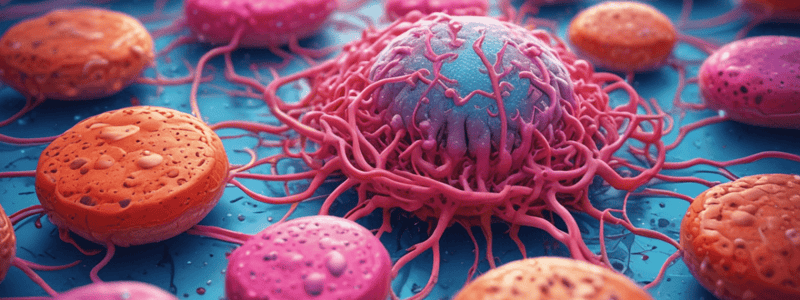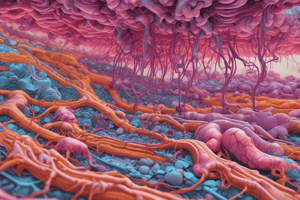Podcast
Questions and Answers
Arthropod vector carries pathogen outside its body called “passive transport” of ______
Arthropod vector carries pathogen outside its body called “passive transport” of ______
pathogen
Biological vector transmission - Arthropod vector supports life cycle of ______ in its body
Biological vector transmission - Arthropod vector supports life cycle of ______ in its body
pathogen
Pathogenicity - Ability of microbe/pathogen to cause disease in a ______
Pathogenicity - Ability of microbe/pathogen to cause disease in a ______
host
Virulence - The enhanced ability of a pathogen to cause ______
Virulence - The enhanced ability of a pathogen to cause ______
Virulence factor - Characteristic or trait of the pathogen that makes it ______
Virulence factor - Characteristic or trait of the pathogen that makes it ______
Parenteral route- Non-oral entry, pathogens directly deposited into tissue or ______
Parenteral route- Non-oral entry, pathogens directly deposited into tissue or ______
Adherence (adhesion) - Ability of pathogens to attach to host ______
Adherence (adhesion) - Ability of pathogens to attach to host ______
Toxin - Poisonous substance (acting as Ag) produced by ______
Toxin - Poisonous substance (acting as Ag) produced by ______
Immune system - protects the human ______
Immune system - protects the human ______
The study of disease is called ______.
The study of disease is called ______.
The study of the cause of a disease is called ______.
The study of the cause of a disease is called ______.
The development of disease is called ______.
The development of disease is called ______.
A ______ disease is spread from one host to another.
A ______ disease is spread from one host to another.
A ______ disease is not spread from one host to another.
A ______ disease is not spread from one host to another.
A ______ infection is limited to a small area of the body.
A ______ infection is limited to a small area of the body.
A ______ infection is an infection throughout the body.
A ______ infection is an infection throughout the body.
A ______ infection is caused by opportunistic pathogens after a primary infection.
A ______ infection is caused by opportunistic pathogens after a primary infection.
Transmission via airborne droplets more than 1 meter is called ______ transmission.
Transmission via airborne droplets more than 1 meter is called ______ transmission.
The ______ are leukocytes with granules in their cytoplasm that are visible with a light microscope.
The ______ are leukocytes with granules in their cytoplasm that are visible with a light microscope.
The ______ release histamine and are involved in allergic responses.
The ______ release histamine and are involved in allergic responses.
The ______ are toxic against parasites and worms.
The ______ are toxic against parasites and worms.
The ______ are phagocytic and work in the early stages of infection as first responders.
The ______ are phagocytic and work in the early stages of infection as first responders.
The ______ travel in blood and will mature into macrophages in tissues where they become phagocytic cells.
The ______ travel in blood and will mature into macrophages in tissues where they become phagocytic cells.
The ______ is the ingestion of microbes or other substance by a phagocyte.
The ______ is the ingestion of microbes or other substance by a phagocyte.
The ______ is the release of chemical signals (cytokines) by a pathogen that attract phagocytes.
The ______ is the release of chemical signals (cytokines) by a pathogen that attract phagocytes.
A ______ is a pathogen that is too big to be engulfed by a phagocyte.
A ______ is a pathogen that is too big to be engulfed by a phagocyte.
The ______ is a waxy lipid that inhibits phagocytosis.
The ______ is a waxy lipid that inhibits phagocytosis.
Phagocytes are able to ______ bacteria and multiply inside them.
Phagocytes are able to ______ bacteria and multiply inside them.
______ is the process of complement proteins coating the surface of a pathogen to promote attraction and attachment of phagocytes.
______ is the process of complement proteins coating the surface of a pathogen to promote attraction and attachment of phagocytes.
Complement proteins bind mast cells, which release ______, increasing blood vessel permeability and attracting phagocytes.
Complement proteins bind mast cells, which release ______, increasing blood vessel permeability and attracting phagocytes.
______ is the study of host defenses against foreign substances (antigens).
______ is the study of host defenses against foreign substances (antigens).
______ immunity fights invaders and threats outside of the cell (extracellular antigens).
______ immunity fights invaders and threats outside of the cell (extracellular antigens).
______ T cells activate cytotoxic T cells involved in cell-mediated immunity and certain B cells to produce antibodies.
______ T cells activate cytotoxic T cells involved in cell-mediated immunity and certain B cells to produce antibodies.
______ T cells, also known as "killer" T cells, destroy target cells on contact.
______ T cells, also known as "killer" T cells, destroy target cells on contact.
______ T cells suppress or turn off the immune response when it is not needed.
______ T cells suppress or turn off the immune response when it is not needed.
______ T cells produce a delayed and exaggerated immune response that can occur from days to years later.
______ T cells produce a delayed and exaggerated immune response that can occur from days to years later.
______ T cells promote a relatively long-lasting immune response.
______ T cells promote a relatively long-lasting immune response.
Flashcards are hidden until you start studying




